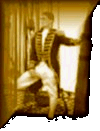

|
|
|
In September, 1814, Sir George Prevost, the Governor General of Canada and the commander-in-chief of the British forces in America, invaded the United States with a well appointed and highly disciplined army of almost fourteen thousand men, and was advancing rapidly to the attack of Plattsburgh, on Lake Champlain, which was at that time the principal military and naval depot of the United States upon the northern frontier.
To impede the progress, and change the course of the advancing column of the enemy, Commodore McDonouogh detached a portion of the light vessels of his squadron to a point on the lake called Dead creek, around which the enemy was expected to pass. These vessels, after having commenced the attack on the British forces, were supposed by Commodore McDonough to be in danger of capture.
 |
Lieut. Duncan proceeded to the scene of action, and assumed the command of the attacking squadron, and so manoeuvered and directed its operation as to extricate the vessels from the danger which impended over them, and accomplished the object for which the attack had been ordered, by which the principal division of the British army was compelled to change its position, and pursue a different route with considerable loss.
While Duncan was so engaged in this perilous and important service, he was, in passing from vessel to vessel, personally exposed to an incessant fire from the enemy; and it was remarked that his person was a principal object of their aim, under an impression (as was subsequently confessed by the enemy) that it was the person of the commander-in-chief of the American fleet on Lake Champlain.
Lieutenant Duncan was finally struck by a cannon ball, which inflicted upon him one of the most desperate and terrible wounds from the effects of which life has ever been preserved. The whole of his right shoulder, including the joint and all the bones and muscles about the shoulder, were carried away, and his shoulder blade and collar bone were also fractured, besides extensive contusions. At first, the wound was supposed mortal, and no hope was entertained of his recovery. Lieut. Duncan was sent to the hospital on Crab Island, when it was proposed by the surgeon to amputate at the shoulder joint, which was prevented by the unyielding opposition of Lieutenant Duncan. He remained on Crab Island until the 11th of September, without receiving any other aid than simple dressing.
During the battle of the 11th of September, he was removed, for safety, to Peru, a few miles distant, where he remained several days, and a great part of the time in a state of delirium, without seeing a surgeon, having been either forgotten, or the surgeons being too much engaged to attend him. Dr. Brown, of the navy, at length visited him, and found him in the most deplorable condition. Lieutenant Duncan was removed across the lake to Burlington, in Vermont, and placed in the general hospital, which was at the time in charge of McDonough's Fleet Surgeon, Dr. Huntt. Duncan's arm was ultimately saved, but was so shattered and weakened, by the loss of some of its essential parts, as to be of but little use to Lt. Duncan.
Lt. Duncan courage and bravery under fire was too briefly mentioned in Comodore McDonough's afteraction report. Duncan's successful mission thus set the stage for the American defeat of the enemy fleet some 5 days later. For his outstanding service Duncan received the thanks of and a sword of honor by Resolution of Congress approved on Oct. 20, 1814.

Last update: Tuesday, July 18 ©Copyright 2001 USS Duncan DDR 874 Crew & Reunion Association. The information you receive on-line from this site is protected by the copyright laws of the United States. The copyright laws prohibit any copying, redistributing, |